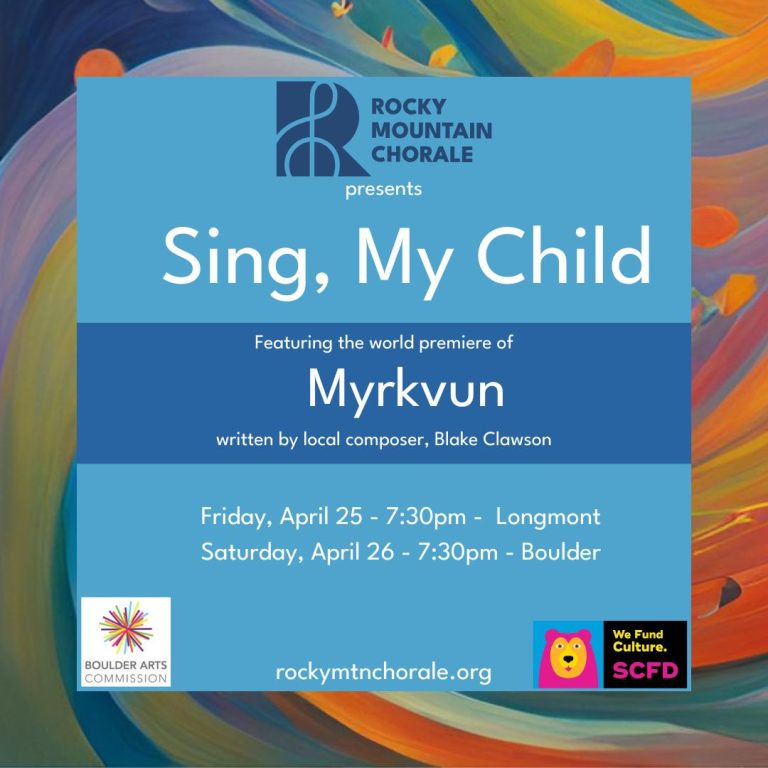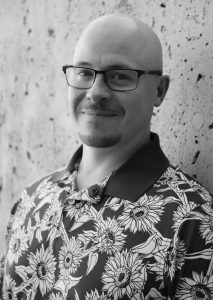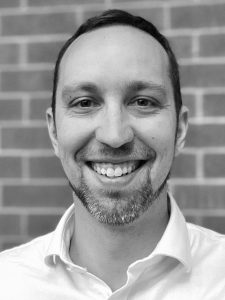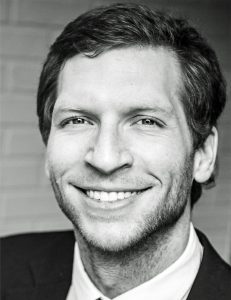
This program is printable for your convenience.
Rocky Mountain Chorale Artistic Staff

Jimmy was born and raised in Denver, Colorado. He began piano lessons at age seven after his parents heard him picking out tunes on the family piano. Jimmy began singing in high school after being urged to audition for the fall musical; he began singing in choir the next year and has remained in love with the choral experience ever since.
Jimmy received his B.A. in Music from Concordia University, where he studied piano with Ms. Patricia Riffel and conducting with Dr. Michael Busch. He recently received his Master’s Degree in Choral Conducting and Literature from the University of Colorado, Boulder, where he studied with Dr. Gregory Gentry and Dr. Andrea Ramsey. Jimmy has performed with the Denver Gay Men’s Chorus, the Collegium Musicum Early Music Ensemble at Regis University, and has conducted and sung with numerous church choirs throughout the Denver area. He is presently music educator at Lyons Middle/Senior High School. Jimmy served as Assistant Director for Rocky Mountain Chorale for two years and was appointed Director in 2017.
His experiences conducting and singing with community and church ensembles have provided him with unforgettable opportunities to share the enormously transformative power of singing in community. Jimmy’s excitement for choral music is unyielding and he believes the future holds unlimited potential for singing communities and their ability to enhance the human experience.
Parker Steinmetz, Assistant Director

Born in Greeley, Colorado, Parker began his musical journey as a clarinet player, though he quickly transitioned to the saxophone. He began singing in his church’s choirs in high school under the direction of Dr. Elmer Schock, and it was Dr. Schock’s nudging that inspired Parker to choose music as his college major.
Parker attended Hastings College in Hastings, Nebraska, where he studied saxophone under Dr. Debra McKim. After being coerced into auditioning for the Hastings College Choir, he quickly realized choral music was his true passion. He found a wonderful mentor in the choir’s director, Dr. Fritz Mountford.
Since moving back to Colorado in 2005, Parker has been an active church and community musician. In addition to directing several church music programs in northern Colorado, he has performed in the Greeley Chorale, the Greeley Chamber choir, the Kream of the Krop big band, and as a guest musician with Montview Westminster Choir for their performance of Dvorák’s Mass in D. He has performed under the direction of many fine conductors including Dr. Jill Burleson Burgett, Dr. Galen Darrough, Dr. Howard Skinner, and Dr. René Clausen. Parker is currently the Music Ministry Director at Longs Peak United Methodist Church in Longmont, Colorado. He joined the Rocky Mountain Chorale in January of 2022.
For over a decade, Walton Lott has explored and performed a diverse range of musical styles, from early Baroque music to works by contemporary composers. Deeply interested in different historical and social dimensions of musical practices, Dr. Lott holds certificates in Historical Keyboard Performance, Music Theory Pedagogy, and Musicology from the University of North Carolina at Greensboro. This entails rigorous and flexible interpretations of works on period and modern instruments that draw from coeval performance treatises and writings about aesthetics and music theory. The philosophical goal of these efforts is to craft a performance that presents the listener with a historically-contextualized reading of the musical score while also showcasing a unique individual interpretation of the work.
Simultaneously, Dr. Lott champions “newer” works, be they Modernist, avant-garde, Minimalist, or works by current composers, and has studied and performed works by Olivier Messiaen, Frederic Rzewski, Steve Reich, Julia Wolfe, Sean Friar, Carl Schimmel, Gyorgy Ligeti, Arnold Schoenberg, Alban Berg, and others.
In addition to solo music, Dr. Lott has long been a participant in collaborative music, playing for a wide range of ensembles and genres of music, including: church choirs, chamber music, orchestral ensembles, chorale ensembles, vocal and instrumental soloists, and jazz and rock ensembles.
Dr. Lott holds a Bachelor’s Degree from Millsaps College, where he studied under Dr. Lynn Raley and Dr. Rachel Heard. In 2012, Dr. Lott completed a Master’s Degree in Music at the University of North Carolina at Greensboro, studying under Dr. Andrew Willis, and has completed his Doctorate of the Musical Arts at the same institution.
Featured Composer
Blake Clawson

Blake Clawson is a composer, performer, conductor, and educator from the Pacific Northwest. His music weaves contemporary classical, jazz, and folk influences into colorful, expressive pieces that captivate listeners. He draws inspiration from poetry and nature, and while choral works on the pensive and Arcadian poems of Sara Teasdale are central to his output, he also writes chamber works that range from scintillating and groovy to introspective and serene.
Blake has written for and collaborated with a wide variety of ensembles, including the effervescent ~Nois saxophone quartet, who recently premiered his work Boomerang. Blake’s choral work Fantasy Arabesque was selected as the winner of the 2019 Opus 7 Robert Scandrett Memorial Composition Award and was performed in Seattle by Opus 7 Vocal Ensemble, directed by Loren Pontén. His orchestral rhapsody Matara was selected as the winner of the 2020 Whitworth University Concerto Competition and was performed by the Whitworth Orchestra under the direction of Philip Baldwin.
Blake has studied with Carter Pann and Brent Edstrom and is currently pursuing a Master’s in Music Composition at the University of Colorado Boulder. He earned a Bachelor of Arts in Music Composition from Whitworth University and has studied at the University of Auckland.
Program
Jimmy Howe, conductor
Parker Steinmetz, assistant conductor
Walton Lott, pianist
Read Director’s Notes
The inception for this concert centered around the idea of experiencing “big feelings.” Admittedly, this and other previous Rocky Mountain Chorale concerts have addressed this idea in various ways due to my own study of emotional intelligence and my personal difficulties with expressing and regulating my emotions as an Enneagram 2. After the deaths of my parents, I realized that I didn’t have the language to express, regulate, or even begin to understand my grief. According to Brené Brown in her book “Atlas of the Heart,” the average emotions people could recognize and name when they were experiencing them were three: happy, sad, mad. As a teacher of high school students and a descendant of emotionally unaware generations, I’ve felt that it is my obligation to learn and help others discover the importance, beauty, and necessity of a nuanced emotional life now that I’ve truly begun to experience my own. This concert is an expression of that pursuit.
O Vos Omnes
-Andrea Ramsey
Lyrics
| Latin text | English Translation |
|
O vos ómnes qui transítis per víam, |
O all who walk by on the road, |
Read Director’s Notes
Our concert begins with Andrea Ramsey’s setting of the Latin text, O vos omnes. Written by the prophet Jermiah in 6th century B.C., these words come from a time of turbulence for the Jewish nation after the fall of King Nebuchadnezzar and the ensuing oppression of the Babylonian Captivity. The composer explains her setting of this text in her own words:
For many years, I thought I would set this text at some point because it held such a dramatic potential. I assumed I would set the work as any other. However, upon my father’s passing away in the summer of 2019 and a rather challenging rest of the year, I decided to craft music for this text as an emotional outlet for my own grief. Upon losing my mother five years prior to losing dad, a trusted counselor shared the importance of giving ourselves permission to experience all the feelings during that first season of grief—and our responses to grief may take many forms. To give ourselves permission to grieve in sorrow, in anger, in numbness, or any other resulting emotion we may encounter is to give ourselves permission to process the reality and move forward. Thank you for allowing me to share part of my grieving process with you.
Big emotions like grief can feel isolating. In the text, the speaker alone in their grief begs the listener to “look and see if there is any sorrow like my sorrow.” The truth is often that we are alone in circumstance, but not emotion. Despite the anguish, the beauty of this text is that it implores us to check in with ourselves, to feel fully, and to empathize with those around us.
Myrkvun
-
- Sumarnótt
- Haust
- Vetur – Anna Hansil, soloist
Elise Cole, cello
-Blake Clawson
*This piece is funded in part by a grant from the Boulder Arts Commission, an agency of the Boulder City Council.
Lyrics
I. Sumarnótt
Steingrímur Þorsteinsson
Sólu særinn skýlir,
Síðust rönd er byrgð,
Hýrt á öllu hvílir
Heiðrík aftankyrð.
Ský með skrúða ljósum
Skreyta vesturátt,
Glitra gulli og rósum,
Glampar hafið blátt.
Stilt með ströndum öllum
Stafar vog og sund,
Friður er á fjöllum,
Friður er á grund;
Heyrist fuglkvak hinzta,
Hljótt er alt og rótt,
Hvíl nú hug minn insta,
Himnesk sumarnótt!
I. Summer Night
Steingrímur Thorsteinsson
The sun hides the sea,
Its last edge veiled,
Gentle calm rests on all,
In the evening’s serene embrace.
Clouds with radiant hues
Adorn the western sky,
Glinting with gold and rose,
The sea sparkles blue.
Stillness graces every shore,
The bays and straits aglow,
Peace rests upon the mountains,
Peace rests upon the ground.
The final birdsong echoes,
All is hushed and still,
Rest now, my innermost mind,
Celestial summer night!
II. Haust
Kristján Jónsson
Allt fram streymir endalaust,
ár og dagar líða;
nú er komið hrímkalt haust,
horfin sumars blíða.
Fölna grös, en blikna blóm,
af björkum laufin detta;
dauðalegum drynur óm
dröfn við fjarðar-kletta.
II. Autumn
Kristján Jónsson
Everything flows forward endlessly,
years and days pass;
now frosty autumn has come,
the gentleness of summer gone.
The grass fades, the flowers pale,
leaves fall from the birches;
a deathly rumble echoes,
the surf against the fjord cliffs.
III. Vetur
Steingrímur Þorsteinsson
Hvar eru fuglar þeir á sumri sungu?
Þeir suður flugu brimótt yfir höf.
Hvar eru blómin sæl frá sumri ungu?
Und snjónum hvíla þau í vetrar gröf.
Hvað er nú söngva? vindgnýr hærri og hærri
um fölnað land, en þung með drunuhljóð.
Þar þögull sjófugl þyrpist brimströnd nærri,
hinn þrúðgi gýmir kveður stirðan óð.
Svo dvelji söngfugl hver einn fyrir handan
og hylji fönnin blómið hvert sem dó.
Vér eigum sumar innra fyrir andann,
þá ytra herðir frost og kyngir snjó.
III. Winter
Steingrímur Thorsteinsson
Where are the birds that sang in summer
They flew southward across the seas
Where are the flowers blissful from summer
Under the snow they rest in winter’s grave.
What is a song now? The wind roars louder and louder
across the faded land, heavy with a thundering sound.
There, a silent seabird flocks near the storm’s shore.
The heavy gull bids farewell with a faltering song.
Then each songbird lingers afar,
And the snow covers each bloom that has passed.
We carry summer in our spirits,
while outside frost hardens and swallows the snow.
Read Director’s Notes
Blake Clawson’s Myrkvun invites us to do just that. This original work is a world premier set to three Icelandic poems depicting the journey from the light of summer through to the darkness of winter. While this piece explores themes of eternity and the inevitability of change as the seasons shift, it also likens to our constantly changing emotional landscape and the knowledge that no one emotion lasts forever. The composer describes his work in his own words:
Myrkvun (“Darkening”) is a three-movement work setting Icelandic poetry about the seasons to music. As the poetry moves from summer through autumn and into winter, the music grows increasingly somber, reflecting the darkening skies through the turning of the year.
The first movement, Sumarnótt (“Summer Night”), captures the peace and splendor of a summer night near the Arctic Circle, where the sun’s light never fully departs. The poet celebrates the evening sky’s resplendent colors, framed against the vast expanse of the sea. The music evokes the luminous beauty of this magnificent night and its tranquil atmosphere.
Haust (“Autumn”) portrays the fading of summer and the arrival of frost. The poem is a meditation on the endless flow of time, with autumn’s harsh weather serving as a metaphor for change and transition. The music reflects this shift, embracing the heaviness and inevitability of the darkening skies and falling leaves.
Vetur (“Winter”) depicts the harshness of winter’s cold and darkness while also wrestling with hope. Birds have departed, leaving behind a quiet and austere landscape, yet the poet finds solace in the knowledge that summer will return, a theme echoed in the music’s blend of starkness and quiet optimism.
Currently serving as Music Director for the new music choir Renova New Music Ensemble as well as a dual master’s student in composition and choral conducting at the University of Colorado Boulder, Blake is an active collaborator and seeker of art that inspires and draws people together. We are grateful for his collaboration and we are excited to premier his new music!We were able to commission Blake with help from the Boulder Arts Commission, an agency of the Boulder City Council. Their generosity and support for local musicians made this project possible, and we’re grateful for their support.
Lacrimosa
-Wolfgang Mozart
Lyrics
Latin text
Lacrimosa dies illa,
qua resurget ex favilla
judicandus homo reus.
Huic ergo parce Deus,
pie Jesu Domine,
dona eis requiem! Amen!
English Translation
Full of tears will be that day
When from the ashes shall arise
The guilty man to be judged;
Therefore spare him, O God,
Merciful Lord Jesus,
Grant them eternal rest! Amen!
Read Director’s Notes
Typically someone who avoids big emotions often avoids the most unpleasant. I have discovered through my own journey that the pursuit of authenticity requires that I move toward these emotions, not away, and that they are just as necessary, informative, and fleeting as pleasant emotional experiences. In his poem “The Guest House,” the poet Rumi advises the listener to “welcome and entertain them all, even if they’re a crowd of sorrows,” and that “[they] may be clearing [us] out for some new delight.” Translated to mean “weeping” or “tearfully,” the Lacrimosa from Mozart’s Requiem mass expresses the kind of unpleasant feeling that may arise when one finally looks inward. The weeping motive throughout the accompaniment and the emotive setting of the text for the choir combine beautifully to depict the weight of this emotional acknowledgement.
The Peace of Wild Things
-Jake Runestad
Lyrics
When despair for the world grows in me
and I wake in the night in fear,
in fear of what my life and my children’s lives may be,
I go and lie down where the wood drake
rests in his beauty on the water, and the great heron feeds.
I come into the peace of wild things
who do not tax their lives with forethought
of grief. I come into the presence of still water.
And I feel above me the day-blind stars
waiting with their light. For a time
I rest in the grace of the world, and am free.
Read Director’s Notes
At the end of his poem, Rumi counsels us to “be grateful for whoever comes, because each has been sent as a guide from beyond.” Fortunately, turning towards these experiences guides one to pursue appropriate expression and regulation. For me, regulation has meant checking in with my body, heart, and mind for what need can be met to either relieve, soothe, or fulfill. Jake Runestad’s The Peace of Wild Things offers nature as one possible solution to worry, sadness, anxiety and despair. The austere beginning of the piece is hollow and hauntingly timeless as the poet expresses the weight and woeful nature of waking in the night with these feelings. The tone of both the text and music shift as we “come into the peace of wild things who do not tax their lives with forethought of grief”. The space within the accompaniment and the polyphonic nature of the voice lines dissipate the feeling much like wind through smoke. The tri-fold repetition of the words “for a time I rest in the grace of the world” serve as three deep breaths: one to acknowledge, one to find presence in the moment, and one to release. The piece concludes with the word “free” as the underscoring fades to nothingness.
Ain’t No Grave Can Hold My Body Down
-arr. Paul Caldwell & Sean Ivory
Lyrics
Ain’t no grave can hold my body down. They ain’t no grave can keep a sinnuh underground.
Oh, I will listen for the trumpet sound. Ain’t no grave can hold my body down.
You know they rolled a stone on Jesus. And then they tried to bury me.
But then the Holy Ghost it freed us so we could live eternally.
Sistuh you better get cho ticket if you wanna ride.
In the mornin’ when Jesus call my numbuh, I’ll be on the other side.
Ain’t no grave is gonna hold me. Ain’t no man is gonna bury me.
Ain’t no serpent gonna trick me. Ain’t no grave can hold my body down.
I will fly to Jesus in the morning when I die.
I know he will take me home to live with him on high.
I will fly with Jesus in the mornin’. Don’t look here. I’ll be way up in the sky.
Soon one day he’s gonna call me up to heaven for a chariot ride.
Ain’t no grave dug deep enough to hold me. Ain’t no devil been slick enough to trick me.
Ain’t no grave digguh man enough to bury me. You cain’t hold me down!
Read Director’s Notes
Identifying, experiencing, and regulating our emotions leads to the resilience and emotional agility that we need to thrive within the human experience. To avoid our big feelings is what Dr. Susan David, author of the book “Emotional Agility,” describes as dead people’s goals because only dead people never feel anger, the disappointment of failure, or the grief of a broken heart. Similarly, dead people never feel comfort, joy, or celebration. The refrain of Caldwell and Ivory’s arrangement of Ain’t No Grave Can Hold My Body Down expresses the feeling of defiant hopefulness derived from resilience and emotional agility.
Intermission
Senzeni Na
Zoe Lewis, soloist, Sean Goralski, Betty Rasmussen readers
–arr. Michael Barrett
Lyrics
Zulu text
Senzeni na?
Sohlangana ezulwini.
English translation
What have we done (to deserve this)?
One day, we will meet (again) in heaven.
Read Director’s Notes
The second half of our concert program centers around the concept of singing as emotional regulation, both individually and communally. In my experience, singing and expressing within groups has been one of the most cathartic experiences of emotional release I have ever felt (the other, participating in a rage room and breaking things on purpose). Senzeni Na fulfilled this moment of catharsis. The arranger, Michael Joseph Barrett, explains the catalyst for creating this arrangement:
Senzeni Na? (What have we done?) Is arguably the best-known Nguni anti-apartheid struggle song. Its popularity has led it to become an anthem in South Africa against all forms of injustice. On August 24, 2019, a 19-year-old student (University of Cape Town) Ulyinene Mrwetyana was brutally raped and murdered in a South African post office. Gender-based and xenophobic attacks in South Africa are at an all time high. This arrangement was written as a plea…to all South Africans to stand against such needless violence, which has become common place in our beautiful land.
Requiem
-Eliza Gilkyson, arr. Craig Hella Johnson
Lyrics
Mother mary, full of grace, awaken
all our homes are gone, our loved ones taken
taken by the sea
Mother mary, calm our fears, have mercy
drowning in a sea of tears, have mercy
hear our mournful plea
our world has been shaken,
we wander our homelands forsaken
In the dark night of the soul
bring some comfort to us all
O mother mary come and carry us
in your embrace
that our sorrows may be faced
Mary, fill the glass to overflowing
illuminate the path where we are going
have mercy on us all
in funeral fires burning
each flame to your mystery returning
In the dark night of the soul
your shattered dreamers, make them whole
O Mother Mary find us where we’ve
fallen out of grace,
lead us to a higher place
In the dark night of the soul
our broken hearts you can make whole,
O mother mary come and carry
us in your embrace,
let us see your gentle face, mary
Read Director’s Notes
On Sunday, December 26, 2004, a massive undersea earthquake caused a series of devastating tsunami waves that impacted fourteen countries and caused the deaths of approximately 230,000 people. In response, Eliza Gilkison composed Requiem as an invocation to compassion and as a song to prayer and comfort. This song is yet another example of the power of expression in communal song.
Sing, My Child
Christina Schappacher, Jack Harless, soloists
-Sarah Quartel
Lyrics
Sing for the promise in each new morning.
Sing for the hope in a new day dawning.
All around is beauty bright!
Wake in the morning and sing, my child.
Dance in the joy of the day unfolding.
Dance as you work and dance as you’re learning>
All around is beauty bright!
Take in the day and dance, my child.
But when troubles come and worry is all that can be found,
gather your strength and hear your voice. Sing, my child.
Laugh in the cool and the fresh of the ev’ning.
Laugh in your triumph, and laugh in succeeding.
All around is beauty bright!
Rest in the ev’ning and laugh, my child.
Read Director’s Notes
Sing, My Child, the title piece of our concert, implores the listener in the poem to sing, dance, and laugh at the possibilities and challenges of each new morning. However, the lightness of these admonitions are juxtaposed with the reality that troubles and worry do indeed come as life progresses. In the face of this knowledge, the composer prescribes the listener to “gather [their] strength and find [their] voice” in song in order to find peace.
What Was I Made For?
-Billie Eilish O’Connell & Finneas O’Connell, arr. Jennifer Lucy Cook
Lyrics
I used to float, now I just fall down
I used to know but I’m not sure now
What I was made for
What was I made for?
Takin’ a drive, I was an ideal
Looked so alive, turns out I’m not real
Just something you paid for
What was I made for?
‘Cause I don’t know how to feel
But I wanna try
I don’t know how to feel
But someday, I might
When did it end? All the enjoyment
I’m sad again, don’t tell my boyfriend
It’s not what he’s made for
What was I made for?
Think I forgot how to be happy
Something I’m not, but something I can be
Something I wait for
Something I’m made for
Read Director’s Notes
The pursuit of authenticity and expression can often unveil new knowledge of ourselves, causing us to question previously held narratives and how we fit into the world. These discoveries can make us feel like we’re in an emotional purgatory with little information on how to move forward in a new world in which our old stories fail to serve us. Written for the Barbie movie, What Was I Made For expresses Barbie’s discovery that there is a larger world than her own, causing her to lose satisfaction for the life she led in ignorance. At the beginning of the song, the speaker asks, “What was I made for?” acknowledging that her old narrative doesn’t fit her new knowledge. The middle of the song is a pursuit of the consequences of her new knowledge. She also realizes that her boyfriend is unable to hold space for her new feelings, making her feel that much more lonely in her discovery. The song concludes with a realization that all things pass, including the discomfort of a new identity. To quote Susan David, “Discomfort is the price of admission to a meaningful life.”
I Will Not Leave You Comfortless
–William Byrd
Lyrics
I will not leave you comfortless, Alleluia.
I go, and I will come to you, Alleluia.
And your heart shall rejoice, Alleluia.
Read Director’s Notes
In striving for emotionally rich and authentic living, we discover that we can be our own comforters. Through recognizing, understanding, and labeling our emotional experiences we are able to regulate and express ourselves in meaningful ways that align with our values. Our concert concludes with two pieces that give voice to what true emotional freedom feels like. The soothing nature of the text in William Byrd’s I Will Not Leave You Comfortless is perfectly married to the somewhat restrained style of Renaissance polyphony. In this setting, Byrd juxtaposes the text of John 14:18 with a peppering of “alleluia” throughout, promising that comfort can be found even in the midst of our deepest losses.
Alleluia
–Elaine Hagenberg
Lyrics
All shall be Amen and Alleluia.
We shall rest and we shall see.
We shall see and we shall know.
We shall know and we shall love.
Behold our end which is no end.
Read Director’s Notes
Finally, Elaine Hagenberg’s Alleluia declares through the words of St. Augustine that through our self-comfort, “We shall rest and we shall see. We shall see and we shall know. We shall know and we shall love. Behold our end which is no end.”
Rocky Mountain Chorale Members
Soprano 1
Eileen Christofferson
Emily Cogsdill
Saige Curro
Anna Hansil
Kyla Palmer
Megan Rogers
Christie Swoboda
Katherine Ware-Wolniewicz
Soprano 2
Nathalie Bleuzé
Ruth Bleuzé
Claire Douglas
Linda Hattel
Heather McLaughlin
Betty Rasmussen
Christina Schappacher
Elizabeth Tyson
Bibi Vellandi
Alto 1
Riven Evenson
Dianne Ewing
Jennifer Grant
Pam Guthrie
Chelsea Haag-Fernandez
Melissa Johnson
Zoe Lewis
Beth Reid
Pam Sjoerdsma
Emily Smith
Gini Sykes
Alicia Yoho
Alto 2
Nancy Belkov
Susan Bryant
Jeanne Clifton
Julie Hale
Cathy Jenni
Caren King
Sharon Larocque
Betsy McIntosh
Cécile Penland
Pamela Puhl-Quinn
Tenor 1
Paul Gibb
Sean Goralski
Robin Guthrie
Ellen Henderson
James Lockhart
Ryan Theurer
Tenor 2
Rolan Christofferson
Jack Doggett
Peter Hall
Bill Liggett
Rob Schware
Phil Weber
Baritone
Reed Bailey
Sam Hahn
Jack Harless
Ross Holland
Tom Hunt
Jesse Kruse
John Lee
Ben Lewis
Keiran McGee
Kelly McKee
Connor Pierce
Bass
David Butler
Jeff Hale
Paul Hartman
Bob Hopper
Terry Mattison
Tom O’Brien
Willem O’Reilly
Welcome and Land Acknowledgement
Founded in 1978, Rocky Mountain Chorale (RMC) is one of the Boulder area’s oldest and finest community choirs. Thank you for joining us.
As we gather, we acknowledge that we are on the ancestral homelands and unceded territory of Indigenous Peoples who have traversed, lived in and stewarded the lands of Boulder County. The Indigenous Nations include the Cheyenne, Arapaho, Ute and many other Native American nations who were removed unjustly, and that we in this community are the beneficiaries of that removal. We honor them as we gather here to engage as a community to work toward healing and develop a culture of inclusion through music.
Please silence your cell phones and other electronic devices during the concert.
Thank you.
Support RMC
RMC has been a source of joy, inspiration, and community for nearly 50 years. Our work isn’t possible without the generous support of donors like you. Every contribution – of ideas and imagination, of time, energy, and resources – is a crucial part of our success. Your generosity helps us move our community forward in tangible, exciting, and lasting ways. Please consider giving a gift to support RMC.
Individual donations can be made by clicking here.
Rocky Mountain Chorale is a 501(c)(3) organization. All contributions are tax deductible.
Thank You!
The Rocky Mountain Chorale would like to extend a special thank you to the following individuals and organizations for their generous contributions.
Advertisements: Sean Goralski
Grants: Terry Mattison, Kyla Palmer
Program: Christie Swoboda
Lyric Sheet: Pam Sjoerdsma
Rehearsal Tracks: Walton Lott
Ticket Table / Ushers: Judith Auer, Sean Haney, Cindy Harless, Mark Harless, George Lawrence, Kathleen Newton, Jada Rholfs, Carol Saunders, Soren Smith, Amine Tarhini, Madeline Yoho
Venue Coordinator and Promotional Materials: Anna Hansil
Volunteer Coordinator: Pam Sjoerdsma
First United Methodist Church
Heart of Longmont Methodist Church
Valmont Community Presbyterian Church
RMC Board of Directors
Officers
Betty Rasmussen, President
Anna Hansil, Vice President
Pam Sjoerdsma, Secretary
Kyla Palmer, Treasurer
Terry Mattison, Past President
Christie Swoboda, Webmaster
At Large Members
Susan Anderson
Eileen Christofferson
Sean Goralski
Chelsea Haag-Fernandez
Jack Harless
Christina Schappacher
The Board of the Rocky Mountain Chorale would also like to thank all the members of the Chorale, not only for their commitment to making beautiful music but also for doing the multitude of volunteer jobs that support this wonderful non-profit. From taking on board positions to coordinating tasks and outreach concerts to setting up risers and helping out with other miscellaneous tasks, the community effort is what makes it work. Thank you all for your contributions!
We gratefully acknowledge our donors!
Individuals
Anonymous
Susan Anderson
Nancy Belkov
Ruth Bleuze
Susan Bryant
Dennis Buechler
David Butler
Eileen & Rolan Christofferson
Jeanne Clifton
Emily Cogsdill
Joyce Costello
Linda DeGolier
Rebecca Dickson
Claire Douglas
Dianne Ewing
Patricia Gaggiani
Sean Goralski
Robert & Pam Guthrie
Julie & Jeff Hale
Peter Hall
Anna Hansil
Ellen Henderson
Ross Holland
Erik Jensen
Melissa Johnson
Lois Labanoski
John Lee
Ben Lewis
Terry Mattison
Keiran McGee
Betsy McIntosh
Heather McLaughlin
Kay Norris
Ann Oglesby
Willem O’Reilly
Kyla Palmer
David & Celia Powell
Pamela Puhl-Quinn
Betty & Doug Rasmussen
Beth Reid
Megan Rogers
Satori Capital, LLC
Carol Saunders
Christina Schappacher
Robert Schware
JoAn Segal
Pam Sjoerdsma
Anthony Stalion
Christie Swoboda
Ryan Theurer
Elizabeth Tyson
Bibi Vellandi
Philip F. Weber
Alicia Yoho
Corporations
Kroger / King Soopers
Medtronics
Mod Market
RaiseRight
Grants
Boulder County Arts Commission
Scientific and Cultural Facilities District
